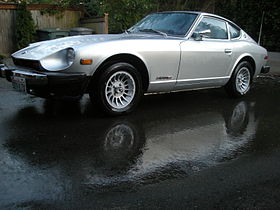Datsun 240Z
| Nissan 240Z, 260Z & 280Z | |
|---|---|
 |
|
| Overview | |
| Manufacturer | Nissan |
| Also called | Nissan Fairlady Z Datsun 240Z Datsun 260Z Datsun 280Z |
| Production | 1969–1978 |
| Assembly | Hiratsuka, Kanagawa, Japan (Nissan Shatai Plant) |
| Body and chassis | |
| Class | Sports car |
| Body style | 2-door coupé 2-door 2+2 coupé |
| Layout | FR layout |
| Chronology | |
| Predecessor | Datsun Sports |
| Successor | Nissan 280ZX |
| Datsun 240Z | |
|---|---|

Datsun 240Z
|
|
| Overview | |
| Manufacturer | Nissan |
| Also called | Nissan Fairlady Z |
| Production | 1970-1973 |
| Designer | Yoshihiko Matsuo |
| Body and chassis | |
| Body style | 2-door coupé |
| Layout | FR layout |
| Powertrain | |
| Engine | 2.4 L L24 I6 |
| Transmission | |
| Dimensions | |
| Wheelbase | 2,305 mm (90.7 in) |
| Length | 4,140 mm (163.0 in) |
| Width | 1,626 mm (64.0 in) |
| Height | 1,283 mm (50.5 in) |
| Curb weight | 1,044 kg (2,301.6 lb) |
| Chronology | |
| Successor | Datsun 260Z |
| Datsun 260Z | |
|---|---|
 |
|
| Overview | |
| Manufacturer | Nissan |
| Also called | Nissan Fairlady Z |
| Production |
|
| Body and chassis | |
| Class | Sports car |
| Body style | 2-door coupé 2-door 2+2 coupé |
| Layout | FR layout |
| Powertrain | |
| Engine | 2.6 L L26 I6 |
| Transmission | |
| Dimensions | |
| Wheelbase | 2,300 mm (90.6 in) 2,604 mm (102.5 in) (2+2) |
| Length | 4,140 mm (163.0 in) 4,445 mm (175.0 in) (2+2) |
| Width | 1,626 mm (64.0 in) |
| Height | 1,283 mm (50.5 in) |
| Curb weight | 1,100 kg (2,425.1 lb) 1,200 kg (2,645.5 lb) (2+2) |
| Chronology | |
| Predecessor | Datsun 240Z |
| Successor | Datsun 280Z |
| Datsun 280Z | |
|---|---|
 |
|
| Overview | |
| Manufacturer | Nissan |
| Also called | Nissan Fairlady Z |
| Production | 1975-1978 |
| Body and chassis | |
| Class | Sports car |
| Body style | 2-door coupé 2-door 2+2 coupé |
| Layout | FR layout |
| Powertrain | |
| Engine | 2.8 L L28E I6 |
| Transmission | |
| Dimensions | |
| Wheelbase | 2,304 mm (90.7 in) |
| Length | 4,399 mm (173.2 in) |
| Width | 1,631 mm (64.2 in) |
| Curb weight | 1,304 kg (2,875 lb) |
| Chronology | |
| Predecessor | Datsun 260Z |
| Successor | Datsun 280ZX |
The Nissan S30 (sold in Japan as the Nissan Fairlady Z and in other markets as the Datsun 240Z, then later as the 260Z and 280Z) was the first generation of Z GT two-seat coupes, produced by Nissan Motors, Ltd. of Japan from 1969 to 1978. One of the most successful sports car lines ever produced, the trend-setting S30 was designed by a team led by Yoshihiko Matsuo, the head of Nissan's Sports Car Styling Studio.
Seeking to compete head-to-head with established European sports cars, Datsun priced the new 240Z within $200 of the British MGB-GT in the United States, a five year-old design that showed its age. The 240Z's sleek styling, modern engineering, relatively low price, and impressive performance struck a major chord with the public. Positive response from both buyers and the motoring press was immediate, and dealers soon had long waiting lists for the "Z".
As a "halo" car, the 240Z broadened the acceptance of Japanese car-makers beyond their econobox image. Datsun's growing dealer network compared to limited production imported sports cars manufactured by (Jaguar, BMW, Porsche, Alfa Romeo, and Fiat ensured both easy purchase and ready maintenance.
All variants of the S30 have a four-wheel independent suspension consisting of MacPherson struts in front (borrowed from the Nissan Laurel C30) and Chapman struts in back. Front disc brakes and rear drums were standard.
The 240Z used twin SU one-barrel side-draft Carburetors. These were replaced on the 260Z with Hitachi one barrel side draft carburetors beginning with model year 1973 to comply with emissions regulations, resulting in diminished overall performance. Bosch designed L-Jetronic electronic fuel injection was added to U.S. 280Zs in 1975 to compensate.
...
Wikipedia
